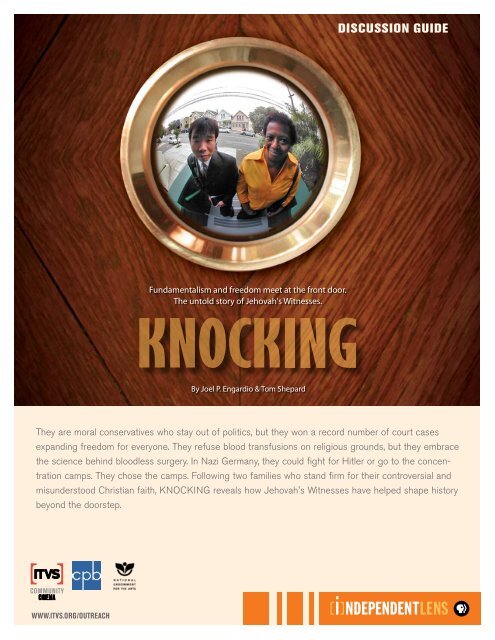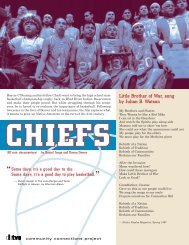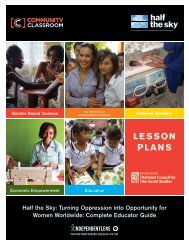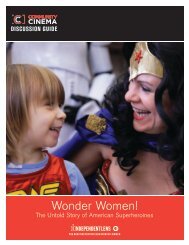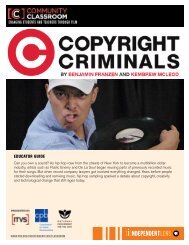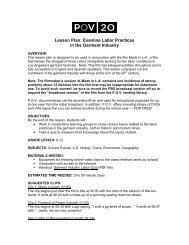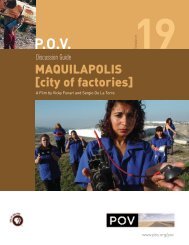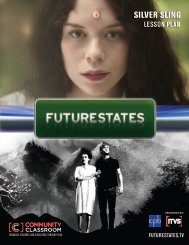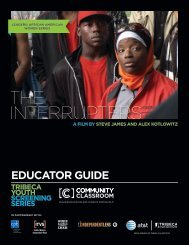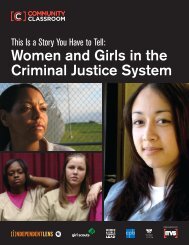discussion guide - PBS
discussion guide - PBS
discussion guide - PBS
You also want an ePaper? Increase the reach of your titles
YUMPU automatically turns print PDFs into web optimized ePapers that Google loves.
<strong>discussion</strong> <strong>guide</strong><br />
Fundamentalism and freedom meet at the front door.<br />
The untold story of Jehovah's Witnesses.<br />
By Joel P. Engardio & Tom Shepard<br />
They are moral conservatives who stay out of politics, but they won a record number of court cases<br />
expanding freedom for everyone. They refuse blood transfusions on religious grounds, but they embrace<br />
the science behind bloodless surgery. In Nazi Germany, they could fight for Hitler or go to the concentration<br />
camps. They chose the camps. Following two families who stand firm for their controversial and<br />
misunderstood Christian faith, KNOCKING reveals how Jehovah's Witnesses have helped shape history<br />
beyond the doorstep.<br />
WWW.ITVS.ORG/OUTREACH
KNOCKING<br />
From the FilmmakeRS<br />
When my mom took me door-knocking on Saturday mornings to<br />
deliver the Watchtower magazine and a Bible message to the neighborhoods<br />
of Saginaw, Michigan, I didn’t realize I was a defender of<br />
America’s essential freedoms: speech, religion and personal liberty. I<br />
was just a kid who would rather be home watching cartoons on television<br />
like the other kids. At that age, being raised as one of Jehovah’s<br />
Witnesses was an embarrassment because it meant I was different.<br />
Getting sent to the principal’s office for refusing to say the Pledge of<br />
Allegiance was not a typical third-grade offense.<br />
Now, as an adult who became a journalist but never joined the<br />
religion, I can see why it’s important that Jehovah’s Witnesses are<br />
different. That’s why I wanted to make KNOCKING. Our essential<br />
freedoms are at war with each other—a culture war. We are divided<br />
by the very principles that defined America. But when Jehovah’s<br />
Witnesses knock, they are demonstrating that the freedoms of<br />
speech, religion and personal liberty can exist in harmony. It is how<br />
a Kingdom Hall of Jehovah’s Witnesses, an abortion clinic and a gay<br />
married couple can peacefully co-exist on the same block.<br />
Jehovah’s Witnesses are moral conservatives who only compete in<br />
the marketplace of ideas. They attempt to persuade—not impose—<br />
their beliefs at your door. If you say “no thanks,” they won’t go behind<br />
your back and amend the Constitution to suit their worldview. The only<br />
world they want to control is their own congregation, which is their<br />
right, and joining it is a personal choice. Jehovah’s Witnesses keep<br />
religion out of politics. Their separation of church and state is absolute:<br />
they don’t vote, pledge allegiance to the flag or serve in the<br />
military. Yet as otherwise law-abiding, tax-paying citizens, they remind<br />
us that the America worth fighting for is an America that does not<br />
force people to follow a single ideology with patriotic fervor. And as<br />
a group with fundamental religious beliefs, they remind us that it<br />
is possible to stand firm in your faith without feeling threatened by<br />
those who choose a different path.<br />
I am drawn to documentary filmmaking as a vehicle for telling untold<br />
stories and doing so in a way that won’t trivialize or sensationalize the<br />
issues and subjects who appear on screen. There are few journalistic<br />
outlets left in our fast-paced society which allow us to relax into<br />
a story, meet engaging characters and be taken on a journey that<br />
really challenges what we know and how we think about the world.<br />
KNOCKING is one of those outlets and was a privilege to co-direct.<br />
Most people have only a vague notion of who Jehovah’s Witnesses<br />
are. Before making this film, I knew very little about them—their<br />
beliefs, their history, their family life and their ways of congregating.<br />
In KNOCKING, we tried to unpackage the stereotype of Jehovah’s<br />
Witnesses as proselytizing zealots. By delving deeply and personally<br />
into the lives of several Witnesses, watching them struggle with life’s<br />
biggest challenges, watching them celebrate deeply held convictions<br />
and watching them negotiate their faith in a world often at odds and<br />
even hostile toward them, we begin to empathize and see Jehovah’s<br />
Witnesses as real human beings, not just caricatures on our doorsteps.<br />
Once this happens, our minds open to important and rarely<br />
discussed information: how Witnesses paved legal precedents regarding<br />
First Amendment rights, how they modeled resistance to totalitarian<br />
authority in Nazi Europe and how their unconventional beliefs<br />
prompted innovation in medicine that benefits all of us. Whether or<br />
not you agree with Jehovah’s Witness beliefs, it is incumbent on you<br />
to know their story, to learn their history, as it is part of your own history,<br />
and to take note of all the important ways they have intersected<br />
with society. I hope KNOCKING adds to this body of knowledge and<br />
gives its viewers pause before avoiding the door next time a Witness<br />
comes knocking.<br />
Tom Shepard<br />
The knocking may be inconvenient, but it is a necessary annoyance<br />
in a free society. And when their own First Amendment rights were<br />
threatened, they went to the U.S. Supreme Court a record 62 times.<br />
Jehovah’s Witnesses prevailed, winning 50 cases that expanded liberty<br />
for everyone—even groups they disagree with. Now we can all<br />
equally share our own message. Better we hear an idea we don’t like<br />
than be forced to live by it.<br />
Joel P. Engardio<br />
Independent Television Service (ITVS) 651 brannan Street, suite 410 San Francisco, CA 94107 Phone: 415.356.8383 email: itvs@itvs.org web: www.itvs.org/outreach PAGE 2
KNOCKING<br />
the Film<br />
KNOCKING, an hour-long documentary, is a portrait of contradictions.<br />
It looks at how the rigid adherence to doctrine espoused by a fundamentalist<br />
religion like the Jehovah’s Witnesses has served to protect<br />
American civil liberties and free choice.<br />
Though Jehovah’s Witnesses are best known for actively proselytizing<br />
door-to-door, they make no attempts to legislate their conservative<br />
morals at the ballot box. In the midst of America’s so-called culture<br />
wars, KNOCKING asks viewers to consider whether or not Witnesses<br />
provide a model for how people who disagree can peacefully share<br />
the public square.<br />
Selected People Featured in KNOCKING<br />
Joel P. Engardio – filmmaker and narrator<br />
Joseph Kempler – a survivor of Nazi death camps who, after the war,<br />
converts from Judaism to become a Jehovah’s Witness<br />
Seth Thomas – a 23-year-old whose need for a liver transplant seemingly<br />
puts him at odds with Witness prohibitions on blood transfusions<br />
What makes this film particularly compelling is its focus on the<br />
personal stories of individual Jehovah’s Witnesses. The story of<br />
Seth Thomas, a 23-year-old in need of a liver transplant, highlights<br />
important medical innovations sparked by religious refusal of blood<br />
transfusions.<br />
The life of Joseph Kempler reveals the under-publicized history of the<br />
persecution of Jehovah’s Witnesses by the Nazis. A Jewish survivor<br />
of Nazi concentration camps, Kempler was so inspired by the strong<br />
faith of his fellow prisoners who were Jehovah’s Witnesses that he<br />
converted.<br />
The personal portraits also point to controversies surrounding<br />
Jehovah’s Witnesses, showing how religious differences can cause<br />
schisms within families. Mostly, the film asks compelling questions and<br />
invites viewers to reflect, making it an excellent tool for outreach.<br />
Independent Television Service (ITVS) 651 brannan Street, suite 410 San Francisco, CA 94107 Phone: 415.356.8383 email: itvs@itvs.org web: www.itvs.org/outreach PAGE 3
KNOCKING<br />
BACKGROUND INFORMATION<br />
History<br />
The Jehovah’s Witnesses began as late 19th-century followers of<br />
Charles Taze Russell’s International Bible Student Association. After<br />
Russell’s death in 1916, a split occurred over leadership and doctrine,<br />
with some members supporting Joseph Franklin Rutherford’s Watch<br />
Tower Society. These followers named themselves the Jehovah’s<br />
Witnesses in 1931. Today, the group claims approximately seven million<br />
followers worldwide.<br />
Structure<br />
Jehovah’s Witnesses do not hire clergy because they consider all<br />
baptized Witnesses to be ordained ministers, and they expect all<br />
Witnesses to provide religious instruction to others. However, individual<br />
Witnesses are not free to interpret scripture for themselves.<br />
The Witnesses are governered by a 10-member Governing Body.<br />
The Governing Body directs the operation of Jehovah’s Witnesses<br />
branches and is given the exclusive right to interpret scripture to form<br />
Witness doctrine.<br />
On the local level, congregations are run by unpaid elders and ministerial<br />
servants (deacon-like positions). Elders are tasked with choosing<br />
congregational activities and providing religious instruction and<br />
spiritual counseling. They also serve on judicial committees that can<br />
mete out discipline, including disfellowshipping (and calling for others<br />
to shun) members who have transgressed against Jehovah’s Witness<br />
doctrine.<br />
• Witnesses do not believe in Hell. The punishment for those<br />
refusing God’s Kingdom is to simply cease to exist without any<br />
consciousness.<br />
• Witnesses believe that they owe allegiance only to God, not to<br />
human governments, so they will not pledge allegiance to any flag or<br />
country, or serve in the armed forces.<br />
• Witnesses are moral conservatives on social issues like pre-marital<br />
sex, homosexuality, abortion and gambling, but they do not act on<br />
those beliefs politically.<br />
• The death of Jesus is marked with a special observance, but<br />
Witnesses reject any holidays that they consider to be an expression<br />
of nationalism (e.g. Thanksgiving), or a practice of false religion. That<br />
includes Christmas, because the Bible does not command the celebration<br />
of Jesus’s birth.<br />
• Transfusions of whole blood are refused because Witnesses believe<br />
that the Book of Acts says that blood should not be shared.<br />
• Witnesses believe that Jesus did not die on a cross but on a "torture<br />
stake" without a cross-bar, so the crucifix is not used as a symbol.<br />
Doctrine<br />
The best-known Jehovah’s Witness publications are The Watchtower<br />
(a journal), short Bible tracts (handed out as part of evangelical<br />
efforts) and a Witness translation of the Bible entitled the New World<br />
Translation. Witnesses believe that the Bible is the inspired word of<br />
God and that Jesus was God’s son, but much of their doctrine is<br />
unique. For example:<br />
• Witnesses believe only 144,000 humans—chosen by Jehovah<br />
God—actually go to heaven to assist Jehovah and his son, Jesus.<br />
Everyone else (including nearly every Jehovah’s Witness) is meant to<br />
live forever in paradise on Earth with no sickness, death, war, famine<br />
or pollution. All races will live together in peace; even the animals<br />
will be peaceful.<br />
• Witnesses believe the Earth will be transformed into paradise after<br />
Armageddon cleanses the world of human governments and evil. The<br />
dead will be resurrected to this paradise to learn about God’s new<br />
Kingdom and given a choice to live in it. In the meantime, Witnesses<br />
believe the dead are unconscious. The soul goes nowhere other than<br />
God’s memory for future resurrection back on Earth.<br />
Independent Television Service (ITVS) 651 brannan Street, suite 410 San Francisco, CA 94107 Phone: 415.356.8383 email: itvs@itvs.org web: www.itvs.org/outreach PAGE 4
KNOCKING<br />
THINKING MORE DEEPLY<br />
General<br />
• If you could ask anyone in the film a question, what would you ask,<br />
of whom, and why<br />
• Before viewing the film, when someone said “Jehovah’s Witness,”<br />
what images came to mind What were the sources of those images<br />
Did the film confirm or challenge what you thought you knew<br />
about Jehovah’s Witnesses<br />
Doctrinal Issues<br />
• What adjective would you use to characterize proselytizing How did<br />
you feel watching the door-to-door efforts in the film and/or the last<br />
time a Jehovah’s Witness approached you Explain your feelings.<br />
• Why do you think Dolores Rasmussen (Seth’s grandmother) thinks<br />
of the Jehovah’s Witnesses as a cult Is she right How would you<br />
deal with a family member whose religious beliefs prevented them<br />
from participating in traditional family gatherings or events like birthday<br />
celebrations or Christmas<br />
• In light of American devotion to freedom of religion and freedom<br />
of speech, why do you think the Witnesses have periodically been<br />
targets of violence and arrest What is the difference between<br />
valuing freedom and valuing pluralism<br />
Medical Issues<br />
• When it looked like no one would perform a transplant without the<br />
possibility of a blood transfusion, how would you have counseled<br />
Seth if he had asked you for advice As specifically as you can,<br />
identify the values on which you would base your opinion. Compare<br />
the values you hold most dear with the values that Seth seems to<br />
weigh the most in this situation.<br />
• Doctors have sometimes forced Witnesses to have blood transfusions<br />
in emergency situations, believing that no religion has a right<br />
to let its members die when it is possible for doctors to save them.<br />
Do you believe that emergency room physicians should respect the<br />
wishes of people like the hockey players in the film, who do not<br />
want blood transfusions Why or why not<br />
Political Issues<br />
• Assessing the Jehovah’s Witness teaching that mixing religion with<br />
politics is unchristian, the filmmaker asks, “Is it possible for a morally<br />
conservative religion to stay out of the culture wars” How would<br />
you answer him<br />
• Would you consider the resistance of Jehovah’s Witnesses to Hitler<br />
heroic Why or why not Do you admire the choice to stay in the<br />
camps rather than sign a paper renouncing one’s faith Why or<br />
why not<br />
• In your view, does protection of freedom of religion necessitate<br />
granting citizens the right to choose obedience to religious principal<br />
over obedience to government edict or law What about exempting<br />
citizens from civic or military involvement for religious reasons If<br />
not, why not If so, under what circumstances<br />
• Towards the end of the film, Dr. Michael Berenbaum says, “Jehovah’s<br />
Witnesses are fundamentalists who have an uncompromising faith.<br />
The largest question in our world today is whether people of uncompromising<br />
faith are going to see it is imperative to act out with<br />
violence toward the other or to act out with decency and dignity<br />
toward the other. So the question of our world may not be whether<br />
we’re going to have fundamentalism or whether fundamentalism is<br />
bad, but what type of fundamentalism we’re going to have.” What<br />
type of fundamentalism is practiced by Jehovah’s Witnesses In<br />
your view, what are the benefits and drawbacks of that kind of fundamentalism<br />
What kinds of lessons can Jehovah’s Witnesses offer<br />
to others in the context of today’s post-September-11 world.<br />
Independent Television Service (ITVS) 651 brannan Street, suite 410 San Francisco, CA 94107 Phone: 415.356.8383 email: itvs@itvs.org web: www.itvs.org/outreach PAGE 5
KNOCKING<br />
SUGGESTIONS FOR ACTION<br />
Together with other audience members, brainstorm actions that you<br />
might take as an individual and that people might do as a group. If<br />
you need help getting started, you might begin your list with these<br />
suggestions:<br />
• Join in community observances of the Holocaust (e.g. Jewish<br />
communal observances of Yom HaShoah). Include the history of<br />
Jehovah’s Witnesses wartime experiences in the observance.<br />
• Hold an informational workshop for medical professionals on treating<br />
Jehovah’s Witnesses. Along with the film, use the American<br />
Medical Association’s Principles of Medical Ethics [ http://www.<br />
ama-assn.org/ama/pub/category/2512.html ] to <strong>guide</strong> a <strong>discussion</strong><br />
on the ethical aspects of treatment options.<br />
• Hold a debate or mock trial on one or more of the key Constitutional<br />
cases brought by Jehovah’s Witnesses (e.g. the right to evangelize<br />
door-to-door without a permit, the right to refuse military service,<br />
salute the flag or say the Pledge of Allegiance, etc.).<br />
• The film ends by noting that 28 countries currently ban the<br />
Jehovah’s Witnesses. Investigate which countries are on that list and<br />
discuss their reasons for the ban. Find ways to protest instances<br />
where you believe the ban is unjust.<br />
For additional outreach ideas, visit itvs.org, the website of the<br />
Independent Television Service. For local information, check the<br />
website of your <strong>PBS</strong> station.<br />
Before you leave this event, commit yourself to pursue one item from<br />
the brainstorm list.<br />
RESOURCES FOR FURTHER STUDY & ACTION<br />
General<br />
http://www.knocking.org - The official website of the film includes<br />
background information on production as well as selected comments<br />
from viewers.<br />
Religious Beliefs<br />
http://www.watchtower.org/ - The official website of the Jehovah’s<br />
Witnesses provides comprehensive information on their beliefs<br />
and work.<br />
http://www.bbc.co.uk/religion/religions/witnesses/ - The BBC<br />
“Religion & Ethics” site provides basic background information as well<br />
as a timeline history of the Jehovah’s Witnesses and a radio debate<br />
on ethical issues involved in treating Jehovah’s Witnesses (click on<br />
the “ethics” tab and scroll to “medical ethics” section). A search of<br />
the entire BBC site (www.bbc.co.uk) will provide links to dozens of<br />
relevant news stories.<br />
http://en.wikipedia.org/wiki/Jehovahs_Witnesses - Although not a<br />
traditional fact-checked source, Wikipedia also provides a wide range<br />
of general information about Jehovah’s Witnesses, including reports<br />
of activities outside the U.S.<br />
http://www.pressbox.co.uk/detailed/Society/Jehovah_s_Witnesses_<br />
<strong>PBS</strong>_Film_KNOCKING_Omits_the_Facts_33760.html - A critique of<br />
the film and the religion by a former Jehovah’s Witness.<br />
History of the Holocaust<br />
http://www.ushmm.org/ - The website of the United States Holocaust<br />
Memorial Museum includes a significant collection of resources<br />
recounting the persecution of Jehovah’s Witnesses before and during<br />
World War II. For a complete list, search “Jehovah’s Witnesses” in ALL<br />
Categories.<br />
U.S. Constitution<br />
http://atheism.about.com/library/decisions/indexes/bl_l_JWIndex.<br />
htm - Inexplicably hidden under the heading of Agnosticism/Atheism,<br />
the website About.com includes “Jehovah’s Witness and Religious<br />
Liberty: An Index of Court Cases.” The list includes summaries and<br />
background information on major cases involving freedom of religion<br />
and freedom of speech.<br />
Medical Issues<br />
http://www.ajwrb.org/index.shtml - The Associated Jehovah's<br />
Witnesses for Reform on Blood is a diverse group of Witnesses who<br />
oppose official Witness teaching on medical treatment involving blood.<br />
http://www.nataonline.com – Network for the Advancement of<br />
Transfusion Alternatives. A website primarily by and for the medical<br />
community to share and discuss new treatment technology.<br />
http://www.noblood.org – An independent website for both patients<br />
and physicians interested in the advancement of transfusion-free<br />
medicine and surgery.<br />
KNOCKING WILL AIR NATIONALLY ON THE EMMY AWARD-WINNING <strong>PBS</strong> SERIES<br />
INDEPENDENT LENS ON TUESDAY, MAY 22, 2007 AT 10 PM. CHECK LOCAL LISTINGS.<br />
KNOCKING was produced in association with the Independent Television Service (ITVS),<br />
with funding provided by the Corporation for Public Broadcasting (CPB). The Emmy<br />
Award-winning series Independent Lens is jointly curated by ITVS and <strong>PBS</strong> and is funded<br />
by the Corporation for Public Broadcasting (CPB) with additional funding provided by<br />
<strong>PBS</strong> and the National Endowment for the Arts.<br />
ITVS COMMUNITY is the national community engagement program of the Independent<br />
Television Service. ITVS Community works to leverage the unique and timely content of<br />
the Emmy Award-winning <strong>PBS</strong> series Independent Lens to build stronger connections<br />
among leading organizations, local communities and public television stations around<br />
key social issues and create more opportunities for civic engagement and positive social<br />
change. To find out more about ITVS Community, visit www.itvs.org/outreach/.<br />
Independent Television Service (ITVS) 651 brannan Street, suite 410 San Francisco, CA 94107 Phone: 415.356.8383 email: itvs@itvs.org web: www.itvs.org/outreach PAGE 6


